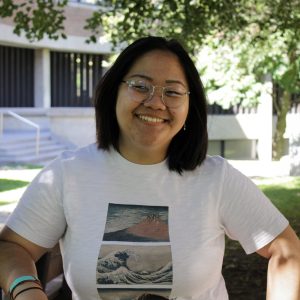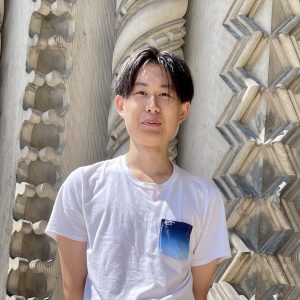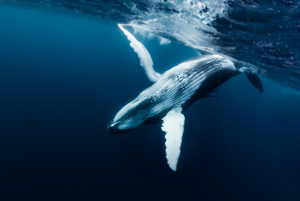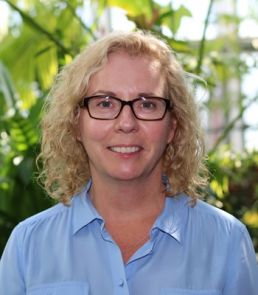Compassion and Commitment earn Jade Zhang the 2022 Nyman Scholarship
 Congratulations to New College student Jade Zhang, who has been awarded the Dr Leslie Paul Nyman scholarship. This award recognizes a plant biology student who has made a stellar impact through community service activities.
Congratulations to New College student Jade Zhang, who has been awarded the Dr Leslie Paul Nyman scholarship. This award recognizes a plant biology student who has made a stellar impact through community service activities.
Zhang excelled in our Molecular Plant Biology lab course CSB350, where she was excited to acquire new techniques from Professors Nambara and Christendat. She was especially glad to get her hands on scientific equipment, rather than seeing the equipment through a screen in virtual labs.
Zhang is committed to helping others. In her first year at New College, Zhang felt college events weren’t helping her connect with her peers. To ensure that her fellow students would feel connected, she joined residence council and student council. In her early years as junior house representative, Zhang was grateful to upper year students who provided her guidance.
Zhang applied her leadership skills to planning orientation events, enhancing their impact through reflecting on her first-year experiences. Her success was demonstrated by successive re-elections as student representative. For New College students at home over the pandemic, contacting her was a moment of escape to talk to someone new.
Her technical skills on virtual platforms provide support for New College and UofT to organize mental health programs. Both the UofThrive and SMART programs benefited from applying her experience in helping students connect and develop during the pandemic.
"If you can help someone, why not do it?" is the straightforward creed Zhang learned from her family and applies in her life.
Congratulations, Jade Zhang!
Fresh perspectives from a CSB summer course overseas

Yutei Shi (UC’23) is returning from an overseas summer course with a new perspective on what’s important to him in his studies and in his career in biology. The CSB397 Research Abroad course offers UofT students a chance for experiential learning through lab-based research in select cities around the world. Shi had hoped to travel to Hong Kong, but COVID restrictions made Konstanz, Germany the best alternative for a host lab.
Shi was accepted to Prof Patrick Müller’s lab, which uses light sheet microscopy to study the development of zebrafish embryos. Shi was nervous to be travelling to a new country and imagined his days would be filled with experiments and paperwork.
He was pleasantly surprised by his reception: “The lab was really helpful and sociable. We would go out for drinks some days on the lawn. Working there really showed me the importance of work-life balance”.
Shi had lab experience from attending teaching labs at U of T, but Müller was interested in his hobby of creating virtual objects using 3D sculpting software. Shi applied his knowledge of coding 3D objects to develop machine learning models for determining the position and orientation of a 2D slice of a fish embryo within the 3D space of the fish embryo. Before moving to the keyboard, Shi was taught at the lab bench to prepare samples through embryo injection, PCR screening and fluorescent imaging.
Shi also took the opportunity of being in Europe to travel with fellow CSB397 students to cities including Madrid, Naples, and Rome. He was struck by how the urban geography of all the cities he visited was derived from the ancient patterns he saw in Rome. Even his train journeys west through Switzerland afforded beautiful views of the Alps. Shi developed an interest in European history from his travels and discussions with his landlord.
With support from Centre for International Experience, Shi had funds to pay rent for a room he found online and for living expenses in Konstanz. This support has revealed to Shi that he wants to find a job in industry upon graduation to provide the stability of a regular salary and the freedom to have his own room.
For students curious about applying to CSB397, the University has previously arranged positions in Hong Kong, Singapore, Japan, Belgium, Czech Republic, Denmark, Germany and Scotland. More information can be found on the CSB397 webpage. A final list of CSB destinations for Summer 2023 will be available in Fall 2022.
Professor Chang's Research Featured in The Atlantic
Dr Sarah Dungan was interviewed about her work in Professor Chang's lab on reconstructing ancestral rhodopsin in cetaceans. The story was published in the Atlantic as "What Did Ancient Whales See?" (external link).
CSB Graduate Wins Award for Best Plant Biology Paper of 2021
 The 2021 Ragai Ibrahim Award for best student paper in plant biology was awarded to CSB graduate Dr Purva Karia by the Canadian Society for Plant Biology (CSPB). . Karia’s award-winning research in Prof Keiko Yoshioka’s lab identified key molecular changes responsible for regulating senescence-related programmed cell death in plants. Dr Karia says ”I’m honored to receive this recognition by CSPB! Thanks to Keiko Yoshioka for the nomination.”
The 2021 Ragai Ibrahim Award for best student paper in plant biology was awarded to CSB graduate Dr Purva Karia by the Canadian Society for Plant Biology (CSPB). . Karia’s award-winning research in Prof Keiko Yoshioka’s lab identified key molecular changes responsible for regulating senescence-related programmed cell death in plants. Dr Karia says ”I’m honored to receive this recognition by CSPB! Thanks to Keiko Yoshioka for the nomination.”
Programmed cell death is initiated in individual cells within a leaf by the active and highly regulated process of leaf senescence. Initiation of leaf senescence occurs naturally by aging, as when leaves turn yellow during autumn.
Senescence can also be induced by a range of external factors such as drought or darkness. This response is mediated by hormones including abscisic acid (ABA). Karia’s studies have revealed a molecular switch to prevent untimely aging which has potential for improving crop yields.
Karia showed that the TTM1 protein, which is localized in the mitochondrial outer membrane, plays an important role in senescence-associated cell death. Her experiments demonstrate that plants lacking TTM1 have delayed natural and ABA-induced senescence, indicating that TTM1 has a universal role as a positive regulator of senescence-related programmed cell death.
A number of TTM1 phosphorylation sites were published in phosphoprotemics studies, but Karia’s work revealed the biological significance of TTM1 phosphorylation. Testing senescence cues including ABA and darkness demonstrated that TTM1 undergoes phosphorylation events at three major sites. Upon perception of senescence cues, multiple MAP kinases phophorylate TTM1, which in turn regulates TTM1 function and turnover.
Karia made specific changes to TTM1 that mimic or block phosphorylation and observed changes in senescence. Karia says “I’m amazed that plants are smart enough to determine in such a fine-tuned manner when it is time to age. It’s impressive that even a minor tweak in phosphorylation can cause changes in aging.”
This result reveals a novel link between ABA, mitochondria, and programmed cell death in plants via TTM1. This opens up a new direction to establish the role of mitochondria in the execution of programmed cell death during the process of senescence and provide a target mechanism for improving drought resistance.
Professor Ragai Ibrahim established his named CSPB award to recognize excellence in research publication by plant biology students. Karia’s award-winning paper in The Plant Journal is titled “Multiple phosphorylation events of the mitochondrial membrane protein TTM1 regulate cell death during senescence”. Congratulations!
Karia is now leading the Sorghum Metabolic Atlas project at Carnegie Science in Stanford, California for her post-doctoral research. Sorghum is a drought resistant crop and by linking the location of metabolic enzymes to their function, Karia and lab head Prof Sue Rhee hope to be able to transfer drought resistant capabilities to other crop plants.
Dean Melanie Woodin elected as Vice-President of the Canadian Association for Neuroscience
 Congratulations to CSB Professor Melanie Woodin on her election as Vice-President of the Canadian Association for Neuroscience (CAN). Prof Woodin has an outstanding track record of scientific productivity and achievements. Her team has spearheaded major advances in our understanding of mechanisms regulating inhibitory synaptic transmission and plasticity in the central nervous system. Of particular interest is her work on the role of excitation/inhibition imbalances in neuropathological disorders including Huntington disease, amyotrophic lateral sclerosis, and autism spectrum disorders.
Congratulations to CSB Professor Melanie Woodin on her election as Vice-President of the Canadian Association for Neuroscience (CAN). Prof Woodin has an outstanding track record of scientific productivity and achievements. Her team has spearheaded major advances in our understanding of mechanisms regulating inhibitory synaptic transmission and plasticity in the central nervous system. Of particular interest is her work on the role of excitation/inhibition imbalances in neuropathological disorders including Huntington disease, amyotrophic lateral sclerosis, and autism spectrum disorders.
Prof Woodin's recent work showed that adeno-associated virus-mediated delivery of chemogenetic technology increased the activity of interneurons in the primary motor cortex and effectively delayed the onset of amyotrophic lateral sclerosis-associated motor deficits, promoted neuronal survival, and increased lifespan (Brain 2020). These exciting findings provide new insights into the pathogenesis and treatment of amyotrophic lateral sclerosis. The impact of her work is evident in the quality, novelty, and originality of her scientific publications.
Prof Woodin is currently the Dean of the Faculty of Arts & Science at the University of Toronto, one of the many important leadership roles she has played at the University of Toronto over the years.
Prof Woodin has been a strong supporter of CAN since its inception, serving in the role of Symposium Organizer (2008, 2011), Executive Board Member (2013-2016), Meeting Organizer (2016), and Chair of the Advocacy Committee (2018-2019). Her outstanding contributions to neuroscience research, effective leadership qualities, and community service make her uniquely qualified for the position of CAN’s next Vice-President.
Whales evolved swiftly to become deep divers
 Surprising details about the transition of early whales from living on shore to diving down to feast on deep-dwelling prey have been revealed by Dr Sarah Dungan and Professor Belinda Chang of EEB and CSB. Their pivotal result shows that early whales had visual systems adapted to deep diving, firmly linking this change in behaviour to swift evolutionary adaptation.
Surprising details about the transition of early whales from living on shore to diving down to feast on deep-dwelling prey have been revealed by Dr Sarah Dungan and Professor Belinda Chang of EEB and CSB. Their pivotal result shows that early whales had visual systems adapted to deep diving, firmly linking this change in behaviour to swift evolutionary adaptation.
Deep diving by marine mammals is one of the great evolutionary transitions, along with powered flight and living on land, and reveals much about how quickly life can adapt in a changing world.
Whales evolved from mammals that share a common ancestor with hippos and that were partially aquatic. The great mystery of their transition to deep sea foraging was how quickly this ability developed. Dungan had an early fascination with transitional whale fossils, but it wasn’t until she took a course on molecular evolution from Professor Chang that she became inspired to extend her interest in whale fossils to the molecular level. They focused on the rhodopsin protein, which absorbs light and sends a signal that travels through the retina to the brain.
Dungan applied robust data science models to rhodopsin proteins from a variety of living whales and related mammals. This computerized analysis revealed a gene sequence representing the rhodopsin found in the common ancestor of all living whales. Dungan expressed this gene in lab-grown cells to ‘resurrect’ the predicted protein and experiment on purified samples.
Dungan and Chang were astonished by the biochemical properties of the resurrected protein compared to land mammals. Early whale rhodopsin was more sensitive to the blue light that penetrates deepest into the ocean, to a degree that exceeded expectations. Its biochemical properties also suggested that the retinas of early whales could respond rapidly to changes in light levels.
These results mean that the common ancestor of living whales was already a deep diver, able to see in the blue twilight zone of the ocean, with eyes that swiftly adjusted to dark conditions as the whale rushed down on a deep breath of surface air.
Early whales eventually evolved into the many kinds of toothed whales and baleen whales we see today. As separate species of whale evolved, they established ecological niches at various levels of the sea and even in freshwater rivers. Dungan and Chang’s work shows that there were further evolutionary adaptations as members of both groups either surfaced from the early deep levels to hunt closer to the surface or specialized to become even more extreme divers.
This work is published in the journal Proceedings of the National Academy of Sciences as “Ancient whale rhodopsin reconstructs dim-light vision over a major evolutionary transition: Implications for ancestral diving behavior”. Dungan and Chang now plan to resurrect the ancestral whale proteins that transmit the rhodopsin light signal from the retina to the brain to provide insights into the neurological adaptations associated with deep diving. As they probe ancient evolutionary adaptations associated with new behaviours, we will gain greater insight into how animals may adapt to our changing world.
Long-term Research at CSB supported by NSERC Discovery Grants 2022
Congratulations to five researchers at CSB who have earned Discovery Grants starting in 2022 from the National Science and Engineering Research Council (NSERC). This program supports ongoing programs of research with long-term goals over five years rather than supporting a single short-term project.
These grants recognize the creativity and innovation that are at the heart of all research advances. Recipients are not restricted to the specific activities described in their applications, but can pursue topics that grow out of their discoveries. Broadly, this will support CSB research in Molecular Evolution, Systems Biology, Plant Biology, Developmental Biology and Neuroscience. The grants were awarded for the following programs in CSB:
Prof Belinda Chang: Molecular evolution of vision and visual pigments
Prof Darrell Desveaux: Systems Biology of the Plant Effector-Triggered Immunity Landscape
Prof Nicholas Provart: Understanding drought tolerance with cell-type specific-data sets and computational approaches
Prof Ulrich Tepass: Mechanisms regulating epithelial stem cell behaviour
Prof Vincent Tropepe: Neurogenic plasticity and brain development
Tamar Mamourian's Thriving Legacy
 Tamar Mamourian is a powerhouse of knowledge in designing and implementing policy to benefit the University of Toronto community. She recently retired as Chief Administrative Officer of Cell & Systems Biology (CSB), but her legacy spreads well beyond this Department.
Tamar Mamourian is a powerhouse of knowledge in designing and implementing policy to benefit the University of Toronto community. She recently retired as Chief Administrative Officer of Cell & Systems Biology (CSB), but her legacy spreads well beyond this Department.
Tamar’s fondest memory of her time at UofT is the respect and support she received from her colleagues. “If there was anything that I needed assistance with I would extend a [request] for one person. Word will go around I will get not one but five people to help me.” Tamar is grateful for the support she received from a range of Chairs and Deans within the Faculty of Arts & Science. This appreciation grew out of Tamar’s fierce advocacy for making the right thing happen.
In any office, the right thing is hard to plan and execute, but Tamar had an insightful mind and deep experience. A path through the financial systems of the University was the source of Tamar’s effectiveness. As the complexity of expenditures she handled increased from invoicing through reimbursement and operations to CAO, she sought out and applied the reason behind each expenditure policy.
A consistent, reasonable resolution that could be clearly explained to all concerned parties is her hardest-won skill: “The most difficult thing to manage was reconciling the nitty-gritty of science grant funding, so that when you applied a charge to a grant, the reason was clear. Going from financial management to supporting a science department was my greatest professional challenge. I didn’t think I had it in me, but shame on me if I had given up!”
When the University decentralized financial systems (including grants) to the departments, Tamar became actively involved in designing clear policies and procedures. She made the Botany Department a model for the University when she led the pilot to bring all Botany accounting in-house. As the expert on developing and implementing systems for in-house accounting, she was trusted to train staff throughout the Faculty. Botany eventually merged with Zoology and CSB came out of that merger.
CSB Professor Daphne Goring says “I was very grateful that Tamar was my CAO as Chair (2006-2009) for the newly formed CSB Department. Not only were we carrying out all the regular duties of our positions, but Tamar and I were also working closely together to set up the foundations of the new department. I truly appreciated Tamar’s depth of University knowledge and frequent wise advice to help guide me through this process.”
Tamar trains and manages people by sharing her expertise and adds a caring approach. Prof Goring found that “Tamar is a wonderful and kind person, always with a smile on her face, and a real pleasure to work with.”
Tamar says the best part of her job was to make a difference in someone’s life; “I thrive on making a difference; by reaching out, by listening, understanding where they were coming from and making it so they wanted to come to work every day.” This creates an environment of support staff at CSB’s office who love what they are doing.
The Ramsay Wright Building where CSB has its office is a cranky construction that conceals many dormant defects. As building manager, Tamar dealt with frequent flooding, expiring elevators and numerous other crises. She resolved these dilemmas by sourcing the correct person with the necessary skills. Tamar replaced all three malfunctioning elevators and was driven to resolve the flooding problem by replacing the entire roof. She provided support to other divisions housed in Ramsay Wright, such as the Biological Sciences and Imaging Facilities.
This role took on menacing aspects in March 2020 as we were all told to stay home. With courage and honour, Tamar stubbornly took it upon herself to be the only one in Ramsay Wright every day. She felt she had to be there for perishable scientific samples still arriving through delayed supply chains, and to support care for the plants, animals, and stored samples in the building. As hospitals in Toronto became desperate for masks, gloves, and bleach, she coordinated building access so CSB could donate our stocks to the hospitals.
Despite being destined for retirement, Tamar stayed on throughout the pandemic, even training new staff as services gradually resumed. She leaves a happy and thriving department to Benjamin Eldridge, her successor as CAO. As she retires, we will all miss her and take to heart her last message to the Department: “Sign Up! Show Up! Never Give Up!”
Professor Melody Neumann earns U of T's highest teaching honour
Melody Neumann, Associate Professor in CSB and Director of the Human Biology Program, has been awarded the President's Teaching Award, the highest honour for teaching at the University of Toronto. This award recognizes Prof Neumann's sustained and ongoing excellence in Educational Leadership, Teaching Excellence and Educational Innovation
The Award citation details Prof Neumann's many accomplishments
Since joining the University of Toronto, Professor Neumann has developed, taught, and coordinated biology courses ranging from large first and second-year cell and molecular biology courses with labs, to flipped and online courses, to advanced project-based laboratory and team-based research courses.
Professor Neumann has created numerous animations related to cell and molecular biology as well as authentic assignments for assessing scientific writing, reasoning, and information literacy skills for both majors and non-majors. Professor Neumann is the creative inventor of Team Up!, a group based-assessment tool that has been successfully used by more than 20,000 students for active learning, peer teaching, and team skill development in large, hybrid, and fully online classes. Professor Neumann has been instrumental in the continued development and pedagogical support of Team Up! in more than 150 courses across all three University of Toronto campuses.
Professor Neumann is widely recognized as an innovative and skilled educator both within the University and beyond. She has been the primary or co-investigator on more than 15 successful institutional and provincial teaching and learning grants. She has been a recipient of the Faculty of Arts and Science Dean’s Outstanding Teaching Award and is an inaugural member of the Faculty of Arts and Science Online Teaching Academy, where her innovations have provided benefit to instructors and students across U of T. Her expertise as an educator has been recognized by other institutions through her work as an external reviewer as part of the Ministry of Colleges and Universities’ Quality Assurance Framework and she has garnered recognition at the international level through invited presentations and two international awards for her group assessment application, Team Up!
We are proud to have her on our team. Congratulations!
Renewed Canada Research Chair for Prof Fernandez-Gonzalez
Congratulations to Professor Rodrigo Fernandez-Gonzalez on the renewal of his tier two Canada Research Chair in quantitative cell biology and morphogenesis! Professor Fernandez-Gonzalez studies cytoskeletal dynamics and mechanical forces in the assembly and repair of epithelial tissues. His lab focuses on wound repair, heart development and collective cell behaviours in epithelial morphogenesis.


